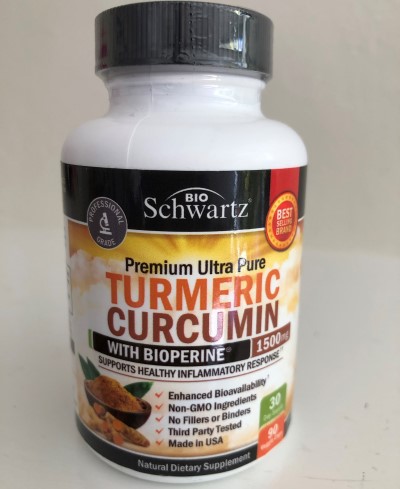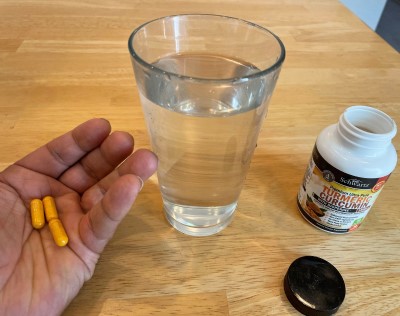
How I’m using turmeric curcumin for inflammation, pain, and better sleep
By Jason Wooden, PhD | July 8, 2021
We review products we think are helpful for our readers. If you buy through a link on this page, we may earn a referral fee at no additional cost to you. More
Why I decided to give turmeric a try to help my pain and sleep
If you’re like me and the millions of other adults in the US who suffer from chronic pain, you’re always on the lookout for more ways to get relief.
It’s not just what it does to you during the day, but how it also wrecks your nights.
Chronic pain makes it harder to fall asleep and can cause you to wake up during the night as you toss and turn to get more comfortable.
That’s the perfect recipe to keep you out of the deep restorative REM sleep you need to wake up feeling refreshed.
For me, it all started about 2 years ago when I begin to experience nagging pain in my shoulder and neck.
As to why it started, it could have been an ergonomic injury from sitting in front of the computer for hours every day, sleeping on my shoulder to help my sleep apnea, or simply getting older.
I’m guessing all of the above.
Eventually, it got so bad I couldn’t do everyday things like making dinner, household chores, or driving a car. What’s worse was that it made it almost impossible for me to sleep at night.
Talk about feeling miserable.
If any of this sounds familiar, you should know you’re not the only one – there are over 100 million people in the US alone who suffer from chronic pain.
Many of them often have sleep issues. In fact, night time pain is one of the biggest issues for sleep.
Fortunately, I was able to get things more manageable with the help of a great pain specialist and some serious lifestyle changes. However, after a year of popping over the counter pain meds to help me sleep at night, my doctor shared concerns with me about the health risks of using them as a long term remedy.
(Yes, over the counter pain meds have side effects, especially if you’re using them on an ongoing basis.)
She urged me to wean myself off of them as soon as I could which meant I needed an alternative for my pain management.
I was hoping to find something that’s natural, affordable, and could actually help.
That’s when I got more interested in using turmeric for pain and sleep.
What so bad about pain meds?
Pain meds can be a godsend, but unfortunately they come with side effects. The more powerful prescription painkillers have some pretty serious downsides.
Opioids such as codeine, morphine, oxycodone, and Vicodin have been linked to:
- confusion
- nausea
- constipation
- sexual dysfunction
- low blood pressure
- itching
They’re also highly addictive and over time you need higher amounts to get the same effect. Some may eventually make you more sensitive to pain.
Even common other the counter pain meds have long-term downsides. When taking excessively, they’ve been linked to bleeding, liver, kidney, and heart issues.
That’s a lot of motivation to look for other ways to help manage your pain, especially if it’s become an ongoing issue.
Let’s take a look at what turmeric can do for pain and better sleep.
Why turmeric for pain and sleep?
Turmeric is known for its use in Indian curries and other middle eastern dishes. It’s certainly worth a try given its historic use in both traditional Indian and Chinese medicine.
Curcumin is the main component of turmeric responsible for its well-known and powerful biological properties. It’s been used to help with ailments ranging from arthritis to heart disease.

It’s natural, no prescription is needed, and it won’t comeback to bite you the way pain pills can.
Sounds too good to be true?
It turns out turmeric is one of the most well-studied natural bioactives and research has shown it’s a powerful inflammation fighter. It’s also been shown to be help relieve symptoms of arthritis and other conditions.
It’s pretty obvious that less pain at night means better sleep. However, turmeric can promote better sleep in other ways too.
Did you know that depression and sleep are closely linked? Depressed people sleep poorly and insomniacs are more likely to be depressed.
And there’s growing evidence for a connection between depression and inflammation. What this means is that turmeric’s inflammation fighting power may help with depression which would mean better sleep.
Another way turmeric may help fight anxiety and depression is by boosting the levels of the feel good hormones serotonin and dopamine.
My 30 day test of turmeric for pain and sleep
After taking Aleve and other over the counter pain meds for a year, my goal was to see if I could manage without them and still get sleep.
I had tried skipping the Aleve in the past but would pay for it with poor sleep due to nagging pain in my shoulder.
So, the plan was to switch out my nightly Aleve with a suitable turmeric supplement.
Before making the switch, I was sure to check with my doctor to make sure they didn’t have any concerns.
I told them the exact brand, dosage, and formulation I was using. Fortunately, they were familiar with turmeric’s use for inflammation.
In my research online I found out that turmeric curcumin by itself is poorly absorbed and doesn’t stick around in the body long enough to fight inflammation. What you need to look for is something that contains a bioavailability enhancer.
Experts recommend supplements that have piperine added to it. It’s the major active component of black pepper and when added has been found to increase the bioavailability of curcumin by as much as 2000%!
I chose a turmeric curcumin supplement made by BioSchwartz because it was a well-known brand.
The other things I liked about it were:
- Includes 90 capsules, enough for thirty days
- Includes piperine (“Bioperine”)
- Doesn’t contain fillers and colorants
- It’s manufactured in an FDA-approved facility
- They use 3rd party testing
- Mainly positive reviews
- I can easily get it online
Once my order arrived, I went cold turkey and started taking three capsules in the evening with meals and a glass of water as recommended by the manufacturer.
(This works out to about 1500 mg of turmeric curcumin with piperine.)

I did this for 30 days.
During this time, I continued my doctor appointments and other things we had agreed to as part of my pain management plan. It included regular exercise (walking), eating healthier and avoiding inflammatory sugary carbs, and icing my shoulder at night.
During the first week, I was pleasantly surprised I was able to make it through the night without my usual pain med. The pain was kept reasonably under control enough for me to get decent sleep.
In the following weeks, things continued looking good.
At the end of the 30 day test, I decided to stick with the turmeric.
Since then, there was a week where I had a flare up where things really got aggravated. (Not sure what caused it.)
I took some Aleve and iced at night to calm things down and was able to return to turmeric at the end of the week.
So, I would say for me it’s been a success since I’m weaned off of taking pains daily, I’m still able to sleep at night, and I can now use the pain meds for emergencies.
What’s next?
I’m currently working with my doctor to continue getting better so I recover more fully and no longer need the turmeric.
Tips for using turmeric for inflammation and pain
If you decide you want to see if turmeric can help with your pain management, be sure to check with your doctor first. You should do this for anything new you’re putting in your body.
Everyone’s situation is different. You want make sure it doesn’t interfere with any other meds you’re taking or cause complications, especially if you’re dealing with a medical condition. Also, switching cold turkey from a pain med to turmeric may not be ideal for you.
It’s also worth checking with an alternative medicine practitioner such as an herbalist or naturopathic physician. They can advise as to the best dosing for you and any safety issues.
Fortunately, the pain specialist I was seeing was already familiar with turmeric’s use and other alternative approaches to pain management.
So, based on my experience, I strongly encourage you to:
- Check with your doctor
- Consult with an alternative medicine practitioner, especially if your doctor isn’t familiar with turmeric’s use
- Make a game plan with your doctor
- Use a reputable brand formulated with piperine
You should be aware that even though turmeric has been used for centuries, the long term affects of high dosages haven’t been well-studied.
That’s one of the reasons I’m just using it is as a bridge from pain meds while I work on recovering from the cause of may pain.
Turmeric and curcumin are generally considered safe, but you can learn more about the possible side effects here:
Does Too Much Turmeric Have Side Effects? (Healthline.com)
What Are the Negative Effects of Turmeric? (Medicinenet.com)
Other things besides turmeric that can help with pain and sleep
Obviously, turmeric shouldn’t be the only thing you rely on to manage your pain and sleep better. There are plenty of other drug-free alternatives you can add to the mix that can help with your recovery.
In fact, the plan I came up with my pain specialist has included physical therapy, acupuncture, and clinical massage.
The good news is that many things you do for pain have been shown to also help sleep.
1) Sleep
This at the top of the list because of strong link between pain and sleep. Poor sleep can increase your sensitivity to pain which results in an awful cycle – pain hurts sleep and sleep makes the pain hurt more.
This makes it important to make sure that you do everything you can to get the best possible sleep each night.
Start with sleep hygiene, the everyday habits that set the stage for restful sleep:
- keep consistent wake up & sleep times
avoid naps - exercise during the day
- avoid large meals, alcohol, or stimulants such as caffeine before bedtime
- maintain a regular bedtime routine
- avoid using TVs, laptops, or other electronics before sleep
- keep your bedroom dark, cool, quiet, & relaxing
It’s also important to get a check up. There are lots of medical issues besides pain that can cause or worsen sleep issues including underlying sleep disorders such as sleep apnea.
2) Physical activity
Studies have found that exercise can help people manage pain. Gentle activities such as walking or swimming can help improve your recovery and pain threshold.
3) Physical therapy
Physical therapy uses heat, cold, exercises, massage, and manual manipulation. It can help strengthen muscles and increase flexibility.
It’ll also increase blood flow and help reprogram your nervous system to be less sensitive to pain.
4) Try an anti-inflammatory diet
These diets focus on avoiding specific foods such as refined carbs to help decrease inflammation and consuming more foods believed to fight inflammation.
5) Acupuncture
This technique involves stimulating specific points on the body with thin needles. Research suggests it can help some types of pain.
It should be done by a well-trained professional.
6) Biofeedback
Biofeedback uses electronic devices to increase your awareness of your body functions so you can learn to control them. Depending on the cause, it may help with chronic pain.
7) Massage therapy
This therapy involves massaging the soft tissues of the body. It can help relieve pain through relaxing painful muscles and joints, reducing stress and anxiety, and overriding pain signals.
8) Psychotherapy
Did you know that pain has psychological, and emotional factors? Psychotherapy can change the way you cope with pain and change the stress response in the brain responsible for the release of chemicals that make pain worse.
9) Music therapy
Studies have shown that the right music can help relieve pain. Music that promotes relaxation can alleviate anxiety and stress which contribute to pain.
You may also be interested in:
Product review: How I’m using Joy Organics CBD for pain and better sleep
Product review: A 7 day test ride with the Panda Life Memory Foam Pillow
What to do if your pains med are keeping you awake
Turmeric: A Complete Scientific Guide (everydayhealth.com)
Can pain make sleep apnea worse?
Sources:
1. “Sleep and Pain: How Pain Contributes to Sleep Loss”, 2019, Alaska Sleep Clinic
2. The prevalence and awareness of sleep apnea in patients suffering chronic pain: an assessment using the STOP-Bang sleep apnea questionnaire, Nat Sci Sleep. 2018; 10: 217–224.
3. “Benefits and Risks of Opioids for Chronic Pain”, 2020, verywellhealth.com
4. “Why opioids make pain worse”, healthpartners.com
5. “Hidden Dangers of Over-the-Counter Pain Relievers”, 2021, AARP website
6. Curcumin: A Review of Its’ Effects on Human Health, Foods. 2017 Oct; 6(10): 92.
7. Efficacy of Turmeric Extracts and Curcumin for Alleviating the Symptoms of Joint Arthritis: A Systematic Review and Meta-Analysis of Randomized Clinical Trials, J Med Food. 2016 Aug 1; 19(8): 717–729.
8. “Depression and Sleep: Understanding the Connection”, Johns Hopkins Medicine website
9. The Role of Inflammation in Depression and Fatigue, Front Immunol. 2019; 10: 1696.
10. “Five Things to Know About Inflammation and Depression”, 2018, Psychiatric Times, Vol 35 No 4, Volume 35, Issue 4
11. Antidepressant activity of curcumin: involvement of serotonin and dopamine system, Psychopharmacology volume 201, Article number: 435 (2008)
12. Recent Developments in Delivery, Bioavailability, Absorption and Metabolism of Curcumin: the Golden Pigment from Golden Spice, Cancer Res Treat. 2014 Jan; 46(1): 2–18.
Connect with us:
About Us
Better Sleep Simplified® was founded as a place for you to get clear and well-researched information.
Our goal is to make sure you know about your options so that you take action sooner rather than later.
Check us out on YouTube:
Watch and Learn
Helpful sleep tips, interesting sleep facts and statistics you want to know about
Affiliate Disclosure
This site is a participant in the Amazon Services LLC Associates Program and other affiliate advertising programs designed to provide a means for sites to earn advertising fees by advertising and linking to them.
Important: BetterSleepSimplified.com is for informational purposes only and is not intended or implied to be a substitute for professional medical advice, diagnosis, or treatment. Always consult a physician for sleep and health concerns. See additional information.
